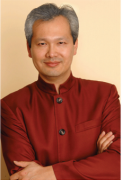Every day, we normally shed up to 125 hairs. We are familiar, however, with the comic character who runs around and pulls out his hair while enduring a stressful situation. You may be amazed to learn there really is a connection between stress and hair loss.
Stress restricts the flow of chi (energy) and blood to the scalp. The severe stress of major surgery or illness can cause hair to stop growing and shift into a resting phase. Two or three months later, the resting hairs suddenly begin to fall out. Stress can also trigger a type of hair loss in which white blood cells attack the hair follicles and halt hair growth.
As we get older, both men and women experience some hair loss. It is a normal part of the aging process and often runs in families. Characterized by a receding hair line and baldness on the top of the head in men, hair loss in women takes the form of a general thinning of the hair.
Both men and women produce the hormone testosterone. Because of interaction with an enzyme, testosterone can be converted to DHT, which shrinks hair follicles. This causes the membranes in the scalp to thicken, become inelastic and restrict blood flow. When the follicles atrophy, hair falls out and usually is not replaced. Since men produce more testosterone than women, they experience more hair loss. Areas of the scalp that are completely bald no longer have live follicles. Areas with shorter, fuzzy, fine hairs still have live follicles that may respond to Chinese herbal remedies.
In Chinese medicine, healthy hair depends on an abundant flow of chi and blood to the scalp. Blood is produced through the digestive process, and blood deficiency can be caused by dietary or digestive insufficiencies. Hair loss is also linked to kidney deficiency syndrome.
Chinese herbs have been effective in promoting hair growth by balancing hormones, restoring kidney energy and directing nourishing blood to the scalp. The main Chinese herbal remedy is he shou wu, which strengthens the hair, increases blood production, and may reverse graying. Herbs such as saw palmetto and licorice root help block the formation of DHT.
Whole foods, particularly the outer skin of plants such as potatoes and cucumbers, as well as green and red peppers and sprouts, give strength to hair because they are rich in the mineral silica. Evening primrose, flaxseed and fish oils help prevent damage to the hair follicles. To increase circulation to the scalp, try tapping with your fingertips or giving your scalp a stimulating massage. Please talk with your doctor at Tao of Wellness if you have concerns about hair loss.
http://www.taoofwellness.com/






Add a Comment1 Comments
As a scientist whose research efforts are focused on testing naturally-derived substances as potential hair loss treatment components, I respect and applaud the philosophy Dr. Ni's message conveys. One of the exciting benefits of the natural approach to health is the fact that botanically-based actives often operate through more than a single metabolic pathway or biochemical mechanism. This is because many such substances are really a 'stew' of fatty acids, sterols and other macromolecules. As a general rule, the alternative therapies report a lower incidence of negative side effect when measured against drugs. The piece of the puzzle that has been missing in the category is empirical third-party medically-published research that demonstrates that a given natural treatment actually does something useful in the setting of the hair follicle. This is the area of investigation in which my lab excels. And while the FDA does not necessarily require published scientific evidence to support the natural hair loss treatment category at the present time, we feel an obligation to the consumer to do so.
We're also pleased and excited to participate in the type of dialogue that excellent websites such as empowher facilitates.
Geno Marcovici, Ph.D.
September 22, 2009 - 6:49pmChief Scientific Officer
HairGenesis®
www.hairgenesis.com
This Comment